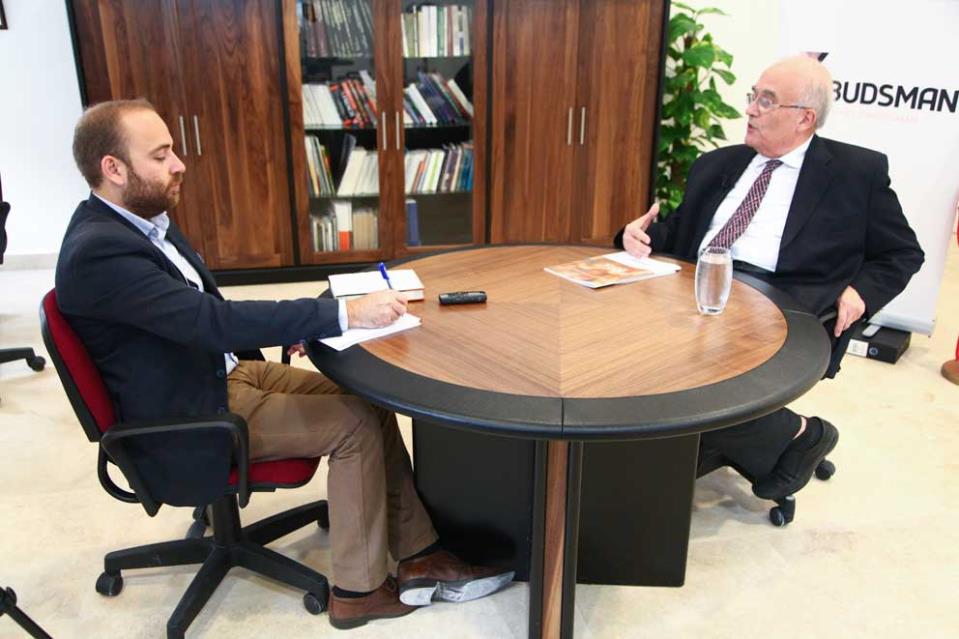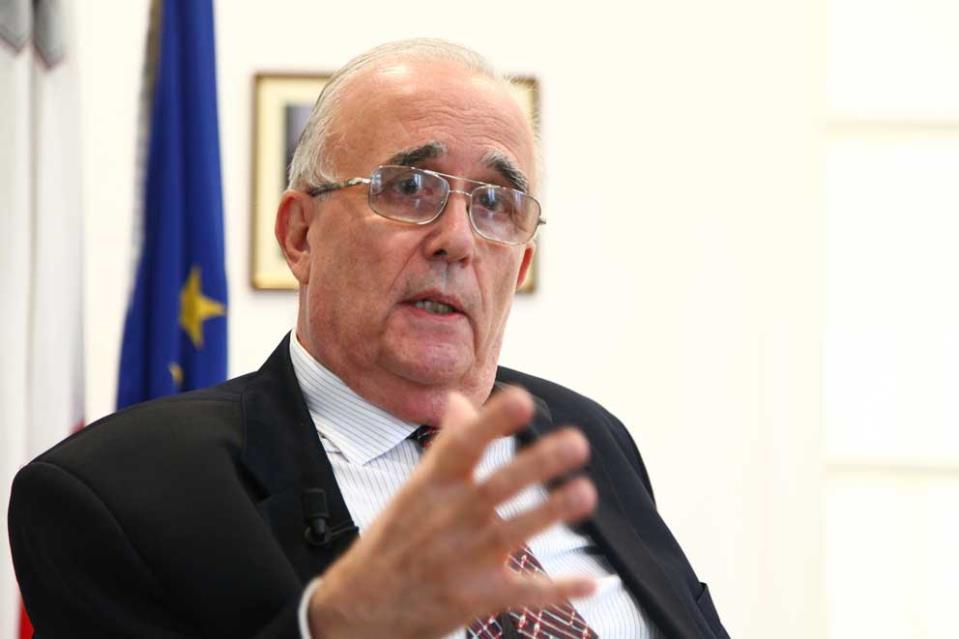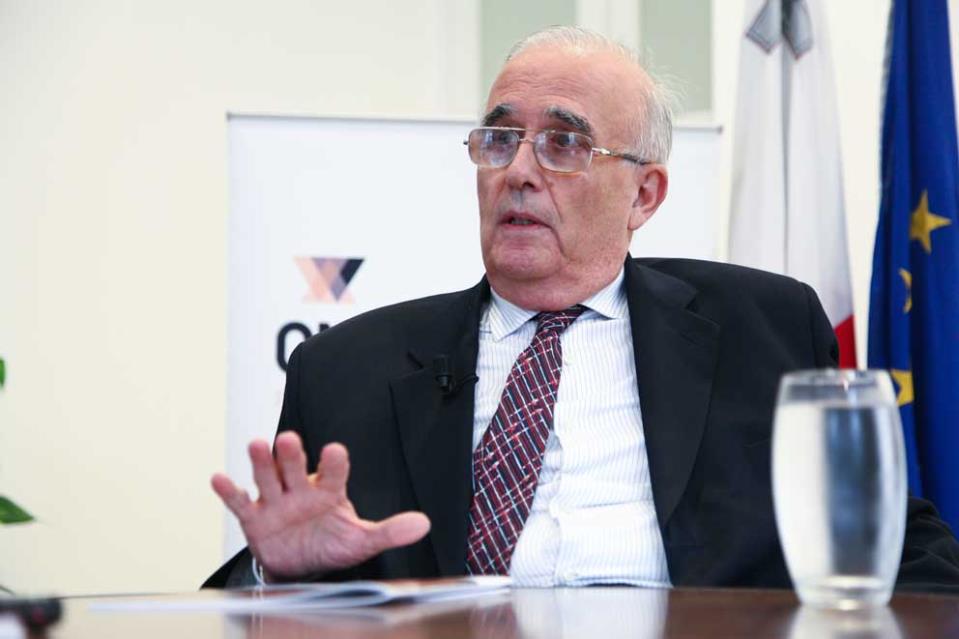Documents on subjects that are deemed to be in the public interest - including contracts - should be published if this is requested in Parliament and there should be "clear rules" on exceptions, Parliamentary Ombudsman Joseph Said Pullicino is proposing.
The former Chief Justice is of the opinion that there should also be an agreed-upon protocol to determine what subjects should be treated as confidential - with the government witholding information - and those that should be considered as being in the public interest.
In an interview with The Malta Independent on Sunday, the Ombudsman criticised the regular squabbles in Parliament over refusals to give information on a myriad of subjects, often with the excuse that the subject is "commercially sensitive", and said there should be consensus on what information should be classified and what should not.
"Information should not only be the rule but a right of the public. People have a right to be informed on subjects that are in their interest. The executive is not the source of power - Parliament is. The executive should always be transparent towards Parliament."
Exceptions should be regulated
The Ombudsman noted that there can be some acceptable exceptions, such as ongoing negotiations between the government and third parties, but there should be special mechanisms to keep the President and the Opposition Leader informed of important developments. "I am not saying that this does not happen but things should be regulated."
Making it amply clear that this is merely his opinion and that he is simply proposing a debate on the subject, Dr Said Pullicino said Malta's Information Act is not up to the same level as those of more progressive countries. "I am not saying that we should be allowed to see Cabinet papers, but I do think that, on the other hand, we are being too conservative."
Refusals to give information are becoming commonplace and in some cases it is obvious that the information requested should be given.
"I believe that the idea that everything can be labelled as 'commercially sensitive' is wrong. I understand that the government should have the right to some exceptions, like ongoing negotiations but, at the very least, the President and the Leader of the Opposition should be kept informed on certain issues that are in the public interest and that should require national consensus. Take contracts. Are they not in the public interests? Should they not be published?"
So, we asked, should the government publish multi-million euro contracts such as, for example, the power station contract? "I will not answer that question. All I can say is that everything that is in the public interest should be published and we need to agree on what is in the public interest. Replies should also be timely."

Positions of trust
In the Ombudsplan report, which was published recently and is due to be debated in Parliament at the beginning of December, the former Chief Justice noted that appointments on the basis of a position of trust are becoming more frequent.
When asked to elaborate on this observation, he said: "This was simply a reflection of mine. The debate on the Ombudsplan gives this office a rare chance to indicate administrative issues that are of concern to the public. I am suggesting a debate on the subject and my comments should not be considered a censure on the government or its policies."
Dr Said Pullicino said the issue is not a new one and has been evolving from one adminsitration to the next. "The issue of positions of trust is linked to the economic and social development of the country. I understand the need for any government to ascertain a safe presence in the civil sector. It seems, however, that we are adopting an American-style approach whereby a change in administration brings with it widespread changes in the civil sector. I am not saying that I am against this but if this is the new way of doing things. we should say so. These changes also have to be made in a transparent and accountable manner."
There have to be clear, agreed-upon rules that have to be adhered to, including the publication of conditions of service. There is also the issue of the law since the Constitution imposes certain rules and regulations on how and when public appointments can be made. "There is a lack of clear thought on the subject and this issue has to be addressed."
Dr Said Pullicino also noted that positions of trust used to be limited to a few people within ministerial secretariats but have, over time, become far more common. "I undestand that the Minister's driver would be appointed as a person of trust but I cannot understand how several other appointments, even in the public sector, are made on the same basis. This also applies to the previous administration."

The AFM issue
Turning to other matters, the Ombudsman spoke on the ongoing disagreement with the government over who has jurisdiction to hear complaints from AFM officers.
The Ombudsman's Office has had to suspend its investigations into claims by AFM officers because of a disagreement with the Home Affairs Ministry, which is insisting that the Ombudsman does not have jurisdiction. The government first claimed that, according to the Armed Forces Act of 1970, complaints by officers can be taken to the President of the Republic through the Commander. The Ombudsman, however, is insisting that the Ombudsman Act - a special law that overrides general law - changed matters and AFM officers have to take complaints to the Ombudsman's office.
"The reason why we insist that there was a need for the Omudsman Act and why our interpretation of the law is the correct one is the fact that times have changed from when the Queen, and then the President, was the supreme head of the army. This concept is no longer valid."
Government has changed its tune
Dr Said Pullicino said that government first started to argue that the AFM Act is still valid. Now it has changed tack and is claiming that the law is not sufficiently clear and should be revised. "We had meetings with the Home Affairs Ministry and were given to understand that amendments to laws would be proposed to clarify the situation. We are not in a position to say how this will be done; there are a number of ways. The law could be changed to preclude officers from coming to this office or it could clarify the laws and allow them to come. We were given the impression that these amendments would be presented as soon as Parliament reconvened but, as of yet, there are no first readings. As long as the laws remain as they are, we will not change our position on the matter."
The Ombudsman has also asked the government for an assurance that, whatever the outcome, his Office will still be able to continue to investigate. "This was fairly recent correspondence and we are still awaiting a reply."
He insists that the AFM issue should not have been so controversial. "After all, these complainants are only asking for something to which they have a right. The law is clear - these officers have the right to seek redress from this office and I do not see why they should not be able to do so."

Not against the Calleja Commission in principle
Apart from the issue of who has jurisdiction to hear complaints by officers, there is another question. The current administration has set up a special commission to hear complaints of alleged army injustices in the past. The Ombudsman says he is not against this commission in principle, but his opinion is that investigations should be external.
"We have nothing against internal mechanisms but we have warned that this might lead to complications for the simple reason that the main reason the Ombudsman's office was established was to have an independent authority to hear and investigate complaints from the outside."
The former Chief Justice said he recollects that a request to appoint similar boards in the past was refused by Prime Minister Alfred Sant who had insisted that these cases should be heard by the Ombudsman. In his opinion, that was the right decision.
"I do understand, however, that things have changed in the past 25 years and this was a political decision we will not interfere in. We will only take a stand if the decisions taken by that commission have a negative effect on others or lead to new injustices. In fact, we do have complaints by AFM personnel claiming that decisions taken by the Injustices Commission have affected them in a negative way."
Trade Unions not the same as the Ombudsman
The Ombudsman also dispelled arguments being made by some that the new right for members of the armed forces to join a trade union has done away with the need for an Ombudsman.
"They are completely wrong. The right to join a union gives you and your friends the union's protection but it does not give the union the right to investigate the government's behaviour. It does not give you the right to report and investigate complaints with the same power granted to this office. There is a cardinal difference. In fact, when members of the Armed Forces come to us and talk about industrial action, we tell them to go to their trade union, we do not even consider them. That is not our job."
Plans for the future
The Office of the Ombudsman is, one might say, expanding. Recently, the office appointed comissioners to specialise on Education, Health and Planning. These have had positive results, with cases that fall under their remit being investigated more efficiently and effectively.
"We have also asked the government - within the context of the AFM issue and independently of it - to consider the possibility of having a commissioner for the security services. The commissioner would cover the army, police, correctional services and other disciplined corps. The Commissioner would not only hear complaints from their personnel but would also investigate the effect of these services on the general public. They could, for example, handle complaints against the police."
The Ombudsman already investigates complaints by members of the AFM and the police, but a specially appointed commissioner with experience in the field would give better results.
The original proposal was made by the previous administration but was shelved. The Ombudsman has now put the proposal forward again and is awaiting the government's reply.
An Ombudsman Law Institute in Malta
Another proposal being put forward by the office is that of establishing a National Human Rights Institution in Malta. "This would consist of establishing an overseeing mechanism consisting of represntatives of authorities and institutions with a specific human rights mandate, including members of NGOs, to investigate, come up with proposals and generally oversee the level of observance of human rights in the country."
Social Dialogue Minister Helena Dalli has studied the proposal and come up with one of her own, which is a bit different. "As long as it is carried out properly, with financial and administrative autonomy, and can receive an A1 accreditation by the United Nations, I have no difficulty in cooperating with the goverment on the project."
Another proposal calls for the establishment of an Ombudsman Law Institute.
"We have presented a document to the Association of Mediterranean Ombudsmen, of which we are founder members, and it was very well-received. The idea is to set up an institute that would produce some 20 to 25 graduates in Ombudsman Law a year and the citizen's right to good public administration. We would be collaborating with the university and also be having visiting foreign lecturers."
Such an institute would accept candidates from Mediterranean countries, including North Africa, and train people in the subject, which is vital for democracy in the region. Graduates could eventually take up senior positions in their own countries and hopefully influence policy-making. The Prime Minister has indicated that he is in favour of the proposal which, he said, fits in perfectly with the government's Euro-Mediterreanean policy.